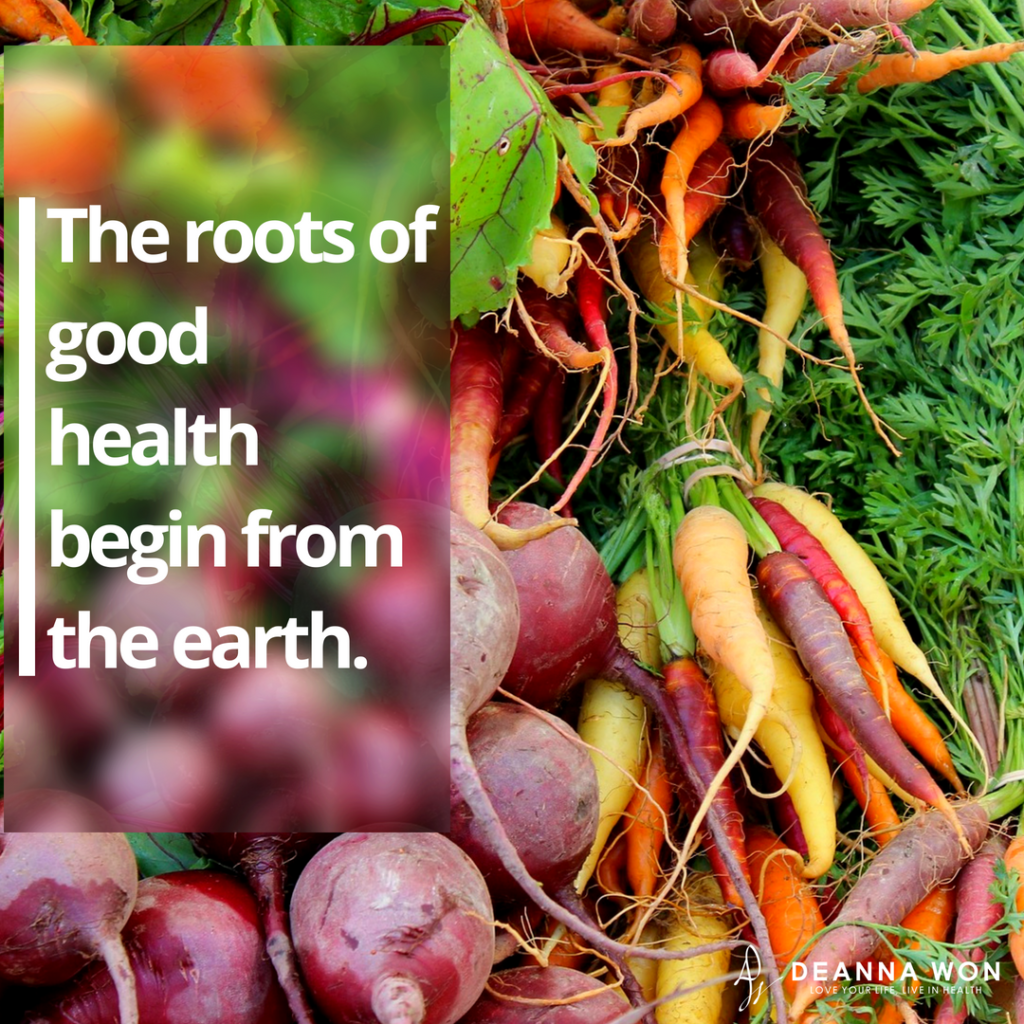If you’re someone who is used to eating the Standard American Diet, comprised of large portions of meat, sides of bread, rice or pasta, and maybe a speck of green on your plate, it may be difficult to switch to a healthier diet that is mostly comprised of vegetables. For many, healthy eating means lots of salads. Unless you’re eating an entrée salad at a restaurant, which is usually comprised of meat, croutons, and other “filling” carbs, you may not be aware of how your plate can include much more than shreds of lettuce, sliced tomatoes, and cucumbers, which will have you hungry within thirty minutes of completing your meal. If you’re eating mostly organic, raw vegan, you don’t necessarily have to eat 100% raw unless you’re really wanting to rapidly detoxify your body. You can actually include 15% cooked by weight of what you’re eating each day.
To add a little variety, bulk, and nutrients to your healthy diet, consider adding root vegetables to your menu. Root vegetables can provide your body with vitamins, minerals, and antioxidants that can help your body stave off diseases like cancer, diabetes, and other inflammatory-related diseases, while keeping your belly full.
Enriched with vitamins and minerals. Root vegetables are rich in Vitamin A, Vitamin C, potassium, and magnesium. As an excellent source for beta-carotene, a carotenoid that is converted into Vitamin A, root vegetables like carrots, sweet potatoes, and beets, are essential for healthy skin, mucous membranes, eyes, and the immune system.[1] The antioxidants found in beta-carotenes and Vitamin C help to balance free radicals in the body which can cause inflammation and eventually lead to inflammatory-related diseases and disorders like diabetes and cancer.[2]
In addition to Vitamins A and C, almost all root vegetables contain the antioxidants lutein and zeaxanthin which are essential for the health of your eyes. Darker-hued root vegetables, like purple sweet potatoes and carrots, contain anthocyanins. Altogether, these antioxidants are helpful in reducing oxidative damage as well as brain degeneration.[3]
The Vitamin A found in root vegetables also nourishes the liver and purifies the blood.[4] By removing toxins from the blood, circulation is improved, which helps to improve cardiovascular health.
Rich in fiber. Root vegetables are much denser and stay in your digestive tract much longer which helps to prevent the quick onset of hunger. Their rich fiber content aids the body in eliminating waste from the body, which aids the body’s digestive process, prevents excess toxins from leaching into the bloodstream, and helps in eliminating excess weight.
Hormone Balancing. We know that the exercise of grounding yourself with the earth can help to bring your body back into balance. The same can be said about eating vegetables that grow below the soil. When our bodies are experiencing an excess of stress hormones, causing a temporary increase in heart rate, blood pressure, and breathing rate, what we eat can play a significant role in bringing our stressed bodies back into a relaxed state. According to the One Green Planet article, Healing Hormonal Benefits of Cooked Root Vegetables, the relaxing, grounding effect of eating root vegetables are best experienced by eating them cooked, as consuming raw root vegetables energize your body.[5]
Stress can also lead to excess estrogen in the body. Progesterone to balance the amount of estrogen in the body. In women, although the majority of progesterone and estrogen are produced in the ovaries, a small amount is produced in the adrenal glands. With exposure to external sources of estrogen, known as xenoestrogens, from plastics, pesticides, and petrochemicals, estrogen dominance can occur, which can be a contributing factor in hormonally-sensitive cancers.
In men, progesterone is actually the precursor for testosterone, so as men age and testosterone levels decrease, that can lead to an increase in estrogen levels, which can lead to estrogen dominance, as similar in women. When your body is in “fight or flight” mode due to stress, in order to produce the cortisol levels needed to meet the perceived stress, this comes at the expense of progesterone production. This decline in progesterone allows the effects of estrogen unopposed, which can lead to chronic fatigue, weight gain, irritability, low sexual desire, thyroid dysfunction, and cancers of the breast, uterus, cervix, and ovary. To counter the effect of estrogen dominance, root vegetables can aid the body in excreting excess levels of estrogen.[6]
Root vegetables also support testosterone production. For this reason, they are a great source for energy, drive, and focus for athletes and others seeking these same benefits.[7] More importantly, this can be protective for those with prostate cancer.
Which root vegetables should you consider adding to your diet? For starters, let’s begin with the Top 10.
Top 10 Root Vegetables
- Sweet potatoes contain unsurpassed levels of beta-carotene and are also rich in vitamin C, phytonutrients, and fiber. Although they are referred to as “sweet,” these vegetables are actually pretty low on the glycemic index. Therefore, along with the fiber, consuming these will not cause unwanted spikes in your blood sugar.
- Russet Potatoes, or white potatoes, contain antioxidants and high amounts of potassium and manganese, a vital nutrient for nerve and bone health. You can get 22% of your daily value of manganese in one potato.[8]
- Carrots are one of the most widely used vegetables as they can be juiced, eaten raw, or cooked. They are high in antioxidants like lutein and zeaxanthin which are essential for eye health, Vitamins A, D, E, and K, as well as magnesium, potassium, and
- Parsnips, which look like giant white carrots, boast a sweet, earthy taste. They’ve also got plenty of fiber, Vitamin C, folate, niacin, thiamine, magnesium, and potassium.
- Beets contain an abundance of antioxidants and are highly detoxifying for the liver and alkalizing for the body. They help to enhance endurance during strenuous exercise and also aid your body in muscle recovery.[9]
- Turnips are cruciferous vegetables that contain phytonutrients that can help to reduce the risk of cancer. They’re also high in calcium, magnesium, and potassium.
- Rutabagas are high in fiber and contain approximately 47% of your daily intake of Vitamin C.[10] They’re also high in zinc which supports a healthy immune system.
- Butternut Squash is high in beta-carotenes, which help to reduce cancer risk while boosting your immune system, as well as magnesium, calcium, and Vitamin C. Butternut squash can also be used in baked goods as a sugar replacement.[11]
- Winter Squash is high in antioxidants alpha-carotene, beta-carotene, lutein, zeaxanthin, and beta-cryptoxanthin, which are all essential for eye health. As a starch, it also contains antioxidant, anti-inflammatory, and anti-diabetic properties in the form of polysaccharides.[12]
- Jerusalem Artichokes are an excellent source of fiber. One cup of cooked Jerusalem artichokes provides 10 grams of fiber, 3 grams of protein, approximately 25% of your daily need of Vitamin A, 28% of your daily iron need, and potassium.[13]
Some other root vegetables to consider adding to your diet include burdock, a powerful blood purifier; celeriac, or celery root, which is rich in fiber and with a respectable amount of antioxidants; jicama, a crunchy and refreshing favorite in Mexico and South America that is generous in Vitamin C; onions, which are rich in antioxidants, sulfur compounds, making them prized for their ability to strengthen the immune system; and radishes, which are an excellent source of Vitamin C, calcium, molybdenum, and folic acid.
If you’re ready to add more roots to your diet, consider giving this recipe a try.
Sautéed Root Vegetables
Prep time: 10 minutes
Cooking time: 25-35 minutes
Serves 4 to 6
Ingredients:
- 1 sweet potato
- 2 parsnips
- 2 carrots
- 2 turnips or 1 large rutabaga
- 1 daikon radish (or substitute/add in other favorites, like squash)
- 1-2 tablespoons coconut oil
- ¼ onion, finely chopped
- ¼ cup water
- Add sea salt to taste, if desired
- Fresh herbs like rosemary, thyme, or sage
Directions:
- Wash and dice all vegetables into one-inch-sized cubes.
- Add 1 to 2 tablespoons of coconut oil to a pan over low to medium heat.
- Once the pan is heated, add onions and sauté lightly until they become slightly less opaque.
- Add all roots vegetables and ¼ cup water into the pan and cover for 5 to 10 minutes.
- Open and stir occasionally until ready
Note: Any combination of vegetables will work. You can also sauté just one kind of vegetable to also make a nice side dish.
Remember, getting healthier doesn’t mean that you have to eat copious amounts of lettuce that won’t satisfy your hunger. Adding nutrient dense root vegetables will provide you with the fiber, vitamins, and antioxidants that your body needs to stay healthy while keeping your stomach full. Try replacing your grains with root vegetables to reduce your caloric intake and to balance your blood sugar. Your heart and your gut will thank you.
Do you have a favorite recipe for root vegetables? I’d love to know. Please share it in the below comments.
Ready to make your health a priority? Contact me here to schedule your consultation.
References:
[1] Nordqvist, C. (December 14, 2017). All You Need to Know About Beta Carotene – Medical News Today. Retrieved May 21, 20018, from https://www.medicalnewstoday.com/articles/252758.php
[2] Axe, DNM, DC, CNS, J. (n.d.). Top 10 Root Vegetables to Replace Grains – Dr. Axe. Retrieved May 21, 2018, from https://draxe.com/root-vegetables/
[3] Eaton, S. (n.d.). 8 Powerful Benefits of Root Vegetables – DavidWolfe.com. Retrieved May 21, 2018, from https://www.davidwolfe.com/benefits-of-root-vegetables/
[4] Toni, (n.d.). Cleanse Liver, Purify Blood, Cancer Preventive and 3 Other Reasons to Drink Carrot Juice – The Healthiest Alternative. Retrieved May 21, 2018, from http://www.healthiestalternative.com/cleanse-liver-purify-blood-cancer-preventive-and-3-other-reasons-to-drink-carrot-juice/
[5] McClees, H. (2015, June 4). Healing Hormonal Benefits of Cooked Root Vegetables – One Green Planet. Retrieved May 21, 2018, from http://www.onegreenplanet.org/natural-health/healing-hormonal-benefits-of-cooked-root-vegetables/
[6] McClees, H. (2015, June 4). Healing Hormonal Benefits of Cooked Root Vegetables – One Green Planet. Retrieved May 21, 2018, from http://www.onegreenplanet.org/natural-health/healing-hormonal-benefits-of-cooked-root-vegetables/
[7] McClees, H. (2015, June 4). Healing Hormonal Benefits of Cooked Root Vegetables – One Green Planet. Retrieved May 21, 2018, from http://www.onegreenplanet.org/natural-health/healing-hormonal-benefits-of-cooked-root-vegetables/
[8] Axe, DNM, DC, CNS, J. (n.d.). Top 10 Root Vegetables to Replace Grains – Dr. Axe. Retrieved May 21, 2018, from https://draxe.com/root-vegetables/
[9] Toni, (n.d.). Top 10 Root Vegetables You Should Eat More Often – The Healthiest Alternative. Retrieved May 21, 2018, from http://www.healthiestalternative.com/top-10-root-vegetables-eat-often/
[10] Axe, DNM, DC, CNS, J. (n.d.). Top 10 Root Vegetables to Replace Grains – Dr. Axe. Retrieved May 21, 2018, from https://draxe.com/root-vegetables/
[11] Eaton, S. (n.d.). 8 Powerful Benefits of Root Vegetables – DavidWolfe.com. Retrieved May 21, 2018, from https://www.davidwolfe.com/benefits-of-root-vegetables/
[12] Eaton, S. (n.d.). 8 Powerful Benefits of Root Vegetables – DavidWolfe.com. Retrieved May 21, 2018, from https://www.davidwolfe.com/benefits-of-root-vegetables/
[13] Axe, DNM, DC, CNS, J. (n.d.). Top 10 Root Vegetables to Replace Grains – Dr. Axe. Retrieved May 21, 2018, from https://draxe.com/root-vegetables/

